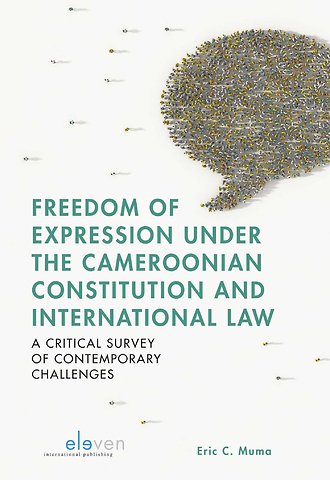Freedom of Expression under the Cameroonian Constitution and International Law
A Critical Survey of Contemporary Challenges
E-book Pdf met watermerkbeveiliging Engels 2020 1e druk 9789054549574Samenvatting
This book examines the right to freedom of expression under the Cameroonian constitution and international law. It argues that the constitutional changes or reforms which have taken place in Cameroon since it gained independence, have resulted in the entrenchment of fundamental rights, including specific phrases in the preamble relating to freedom of expression. These phrases approximate to the standards provided for under international law on human rights.
The book explains the extent to which the general comments and concluding observations of relevant UN Committees, the AU Commission and other related bodies have been influencing the state under consideration to take effective measures to give full effect to freedom of expression. It further argues that despite its constitutional and international guarantee, the right to freedom of expression has not been adequately enjoyed in Cameroon, which is partly due to the lack of well-defined legislation and effective enforcement mechanisms to ensure adequate protection for individual rights holders. In addition, it contends that states must comply with their treaty obligations under international law as a matter of constitutional and human rights doctrine.
Freedom of Expression under the Cameroonian Constitution and International Law will contribute to the academic inquiry into an appropriate legal framework for addressing the right to freedom of expression and other fundamental rights and freedoms and the effectiveness of the various mechanisms put in place by states to deal with human rights violations.
The book will be of interest to international law and human rights scholars, students, judges in local and international jurisdictions as well as the civil society. Finally, it is also meant to inspire further research in the field of civil and political rights.
Trefwoorden
vrijheid van meningsuiting internationaal recht mensenrechten constitutioneel recht grondwettelijk recht afrikaans recht wetgeving rechterlijke toetsing toezichtmechanismen godsdienstvrijheid verenigingsvrijheid politieke participatie nationale veiligheid vergadervrijheid persvrijheid juridische implementatie anti-terrorismewetgeving rechtsstaat mensenrechtencomités constitutionele hervorming
Trefwoorden
Specificaties
Lezersrecensies
Inhoudsopgave
Preface xi
Dedication 1
Acknowledgements 3
List of Abbreviations 5
1 The Historical Evolution of Freedom of Expression 7
1.1 Pre-World War II Era 8
1.2 Between the Wars 12
1.3 Post-World War II Era 13
2 The Legal Framework on Freedom of Expression 21
2.1 International Legal Framework 21
2.1.1 Universal Declaration of Human Rights 21
2.1.2 International Covenant on Civil and Political Rights 24
2.1.3 UN Convention on the Rights of the Child 25
2.1.4 Other Treaties 26
2.2 Regional Legal Framework 27
2.2.1 African Charter on Human and Peoples’ Rights 27
2.2.2 European Convention on Human Rights 29
2.2.3 American Convention on Human Rights 31
2.2.4 The Arab and Asian Charters on Human Rights 32
2.3 Analysis of Cameroon’s Legal and Policy Framework 32
2.3.1 Constitutional Law 33
2.3.2 Mass Communication Law and Penal Code 36
2.3.3 The Common Law Approach 38
3 State Obligations Under Human Rights Law 43
3.1 Obligation to Respect 44
3.2 Obligation to Protect 46
3.3 Obligation to Fulfil 47
4 Rights Associated With Freedom of Expression 51
4.1 Freedom of Association 51
4.2 Freedom of Assembly 64
4.3 Freedom of Religion 73
4.4 Political Participation 74
4.5 Critical Remarks 90
5 The Implementation of Freedom of Expression 91
5.1 The Scope of Freedom of Expression 95
5.2 The 1996 Constitution: A Brief History 102
5.3 The 1996 Constitution: A Catalyst or Framework for Protection 105
5.4 Comparative Interpretation: An Alternative Approach for Constitutional Adjudication 121
5.5 The Domestic Enforcement of International Law 138
6 Limitations and Justifications 141
6.1 Provided by Law 143
6.1.1 The Impact of the Anti-Terrorism Law 150
6.2 Legitimate Aims 160
6.2.1 Rights and Reputations of Others 161
6.2.2 National Security 167
6.2.3 Public Order 171
6.2.4 Public Health and Morals 173
6.3 Necessity 175
7 Supervisory Mechanisms 179
7.1 Global Mechanisms 179
7.1.1 Periodic Reports 180
7.1.2 Inter-State Communications 182
7.1.3 Individual Communications 183
7.2 Regional Mechanisms 184
7.2.1 African Commission on Human and Peoples’ Rights 185
7.2.1.1 Periodic Reports 185
7.2.1.2 Inter-State Complaints 186
7.2.1.3 Individual Communications 187
7.2.2 African Court on Human and Peoples’ Rights 188
8 Domestic Enforcement Mechanisms 191
8.1 Role of the Judiciary 191
8.1.1 Express Role 192
8.1.2 Implied Role 199
8.2 National Commission for Human Rights and Freedoms 203
8.3 National Communication Council 209
8.4 Non-Governmental Organizations 212
8.5 General Observations 216
9 The Manifestation of Freedom of Religion 219
9.1 The Scope of Protection 222
9.2 Legal Framework for the Manifestation of Freedom of Religion 228
9.2.1 National Legal Framework for the Manifestation of Freedom of Religion 228
9.2.1.1 The Constitution 228
9.2.1.2 The Law Relating to Freedom of Association 230
9.2.2 International Legal Framework for Manifestation 232
9.3 The Manifestation of Freedom of Religion in Education 234
9.3.1 Manifestation in Private Education 235
9.3.2 Manifestation in Public Education 236
9.3.3 Manifestation in the Media 238
9.4 Limitations on the Manifestation of Freedom of Religion 240
9.4.1 Public Policy 241
9.4.2 Administrative Control 244
9.4.3 Public Order 247
9.4.4 State Security 250
9.4.5 State Practices Associated With Religion 252
10 Challenges for Effective Implementation 257
10.1 Imprecise Legal Protection 257
10.2 Legal Culture 257
10.3 Language 261
10.4 Cultural Diversity 263
10.5 Corruption 266
10.6 Observation 272
11 Conclusion and Recommendations 275
11.1 Conclusion 275
11.1.1 Impact of the Constitutional System in Cameroon 276
11.2 Recommendations 279
11.2.1 Separation of Powers and Institutional Independence 279
11.2.2 Judicial Activism 280
11.2.3 Globalization of Constitutional Law 281
11.2.4 Africanization or Regionalization of Constitutional Law 281
11.2.5 Constitutional Review and Time Frame 282
11.2.6 Access to Information 283
11.2.7 New Legal and Policy Framework 284
References 285
Anderen die dit e-book kochten, kochten ook
Rubrieken
- advisering
- algemeen management
- coaching en trainen
- communicatie en media
- economie
- financieel management
- inkoop en logistiek
- internet en social media
- it-management / ict
- juridisch
- leiderschap
- marketing
- mens en maatschappij
- non-profit
- ondernemen
- organisatiekunde
- personal finance
- personeelsmanagement
- persoonlijke effectiviteit
- projectmanagement
- psychologie
- reclame en verkoop
- strategisch management
- verandermanagement
- werk en loopbaan







